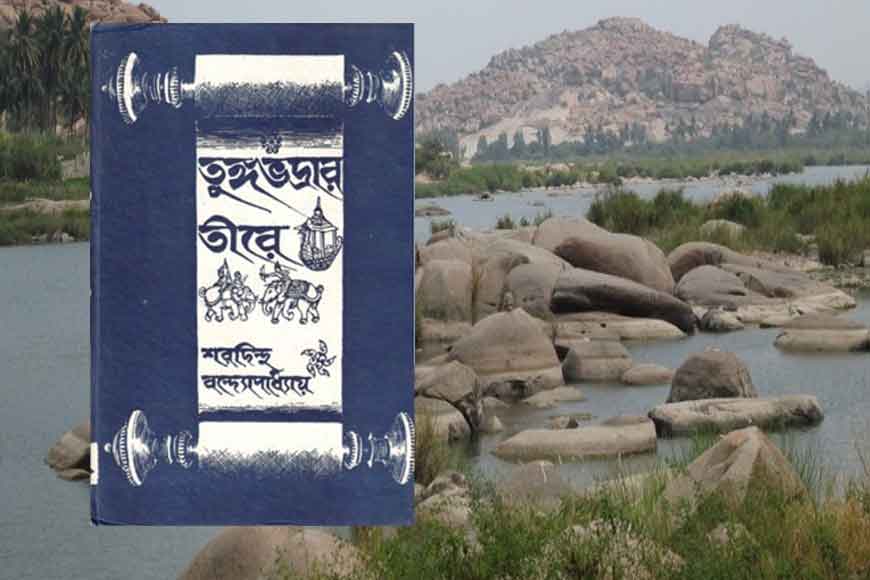Enjoy an excerpt from Saradindu’s Tungabhadrar Teerey

By the Tungabhadra is set around 1430, in the southern Indian Vijayanagar empire, during the reign of King Devaraya (Deva Raya II, who ruled ca. 1425 to 1446). It is a loosely historical novel, as author Saradindu Bandopadhyay builds his story around some of the known facts, such as the threats from Bahmani Sultan, Ahmad Shah and an assassination attempt on the king by his brother.
The story focuses on Devaraya getting ready to take a fourth wife, the princess Bidyunmala of Kalinga, in a strategic alliance. Rather than picking her up himself, however, it is Bidyunmala who travels to her betrothed's kingdom -- by ship, down the Tungabhadra.
An excerpt:
It’s a long voyage -- over three months -- but at least she has good company, too, her step-sister Manikankana. Still, Bidyunmala isn't necessarily thrilled about what lies ahead, arguing (at least to her step-sister, even while she bows to tradition in public) that: “If a wife cannot have her husband all to herself, marriage is meaningless.”Manikankana, on the other hand, sees things differently:
Bidyunmala sat still, her manner morose. 'Suppose King Devaraya took you as his wife too -- would you be able to love him?' she asked.
Manikankana replied, wide-eyed, 'Not to be able to love him! What do you mean? I would love him more than any of his other wives do. I have all the love in the world to offer. Whoever my husband may be, I will love him with all my heart.'
Of course, for Manikankana, it's only a hypothetical .....
Before they arrive at their final destination they also fish a drowning man out of the river, Arjunvarma, who has escaped his native Gulbarga (in northern Karnataka), fleeing the Muslim invaders.
The arrival of the bridal party does not work out well, a hurricane tearing through just as they approach the shore -- "In an instant, destruction reigned". Among the consequences is that Bidyunmala and Arjunvarma get washed away -- and brought together. They are found soon enough, but Bidyunmala is found to be slightly polluted by having been alone with a man like this, and so the wedding is put on hold for three more months, until she has been cleansed; she certainly welcomes the delay -- having fallen hard for Arjunvarma, and now even less eager to marry the king.
The king is a decent guy, however. He took over for his father, who didn't take to nation-leading, realizing six months into his own reign that: "his culinary career was being hampered" by the day-to-day duties of running an empire and is happier now that he gets to spend all his time in the kitchen. They get along well, but the old man loathes his youngest son, Prince Kampanadeva (a middle son, Vijayaraya, is only interested in warfare, and is conveniently always busy on the front). Even as dad mistrusts Kampanadeva, Devaraya refuses to harbor any suspicions about his younger brother. Dad's instincts are right, however, as devious Kampanadeva carefully plans on how to get his brother and his supporters out of the way in a quick coup.
Arjunvarma proves to have some talents that the king admires, but Bidyunmala's passion for the commoner prove to be problematic. While Arjunvarma is not quite as smitten quite as quickly, he doesn't fight it and a relationship of sorts develops, and that's an affront to the king that, of course, can't be tolerated.
Another of the travelers from Kalinga, Balaram, bonds with Arjunvarma and they become best friends. Balaram also brings some special knowledge with him which the king finds useful, and soon he's helping out as well. When Arjunvarma is banished, however, Balaram goes with his friend -- only for them to encounter a great threat to the kingdom.
Arjunvarma not only brings word of the threat back to the king, he also saves the king from Prince Kampanadeva's dastardly plans. And, while Bidyunmala pouts about being forced into marriage while she loves another it is Manikankana who tends to the king and many of his needs. Happily, a happy -- if slightly contrived solution -- sees to it that everyone gets what (and who) they deserve, right down to the remaining shipwrecked couple, long lost a bit farther downriver.
Bandopadhyay also has Arjunvarma and Balaram bring technological innovations (of sorts) to the kingdom. Arjunvarma's long sticks, which he can use as stilts to get around on very quickly, seem a bit silly, but Balaram's ability to manufacture firearms adds an interesting twist; oddly, it's the sticks that get much more prominent treatment in the story, rather than the true game-changer (though Balaram's prototype does come in very, very handy).
It's a pretty good and often quite exciting story, with a nice mix of romance and adventure which Bandopadhyay balances very well, without getting too caught up in one aspect or another. The fact that there are several (potential) couples, as well as a number of possible threats helps, as Bandopadhyay doesn't bog the story down in any one set of characters or problems. On the other hand, the story doesn't go very much in depth, either, and opts for the easiest solutions -- pretty much everything works out not just well but ideally -- making for a very light tale.
While this isn't nuanced, detailed historical fiction, and while some of the writing (and translation) is a bit rough -- alcoholic and other excess at the final celebrations finds: "most members of the brides' party had bit the dust" -- By the Tungabhadra is a pretty good rip-roaring adventure, with some very decorous but still convincingly passionate romance.
A bit simple, but colorful and fun, and a neat glimpse of that part of the world, at that time.
-
M.A.Orthofer, 24 April 2014









